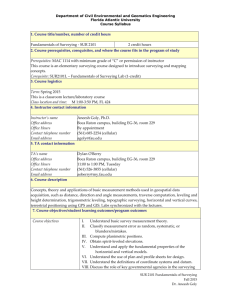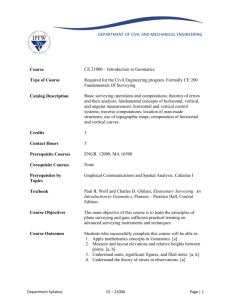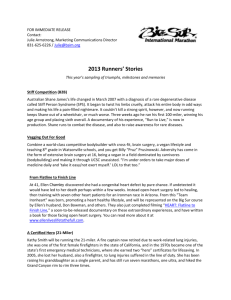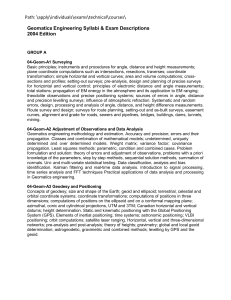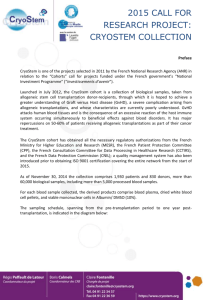Geomatics Engineering The program of study leading to the
advertisement
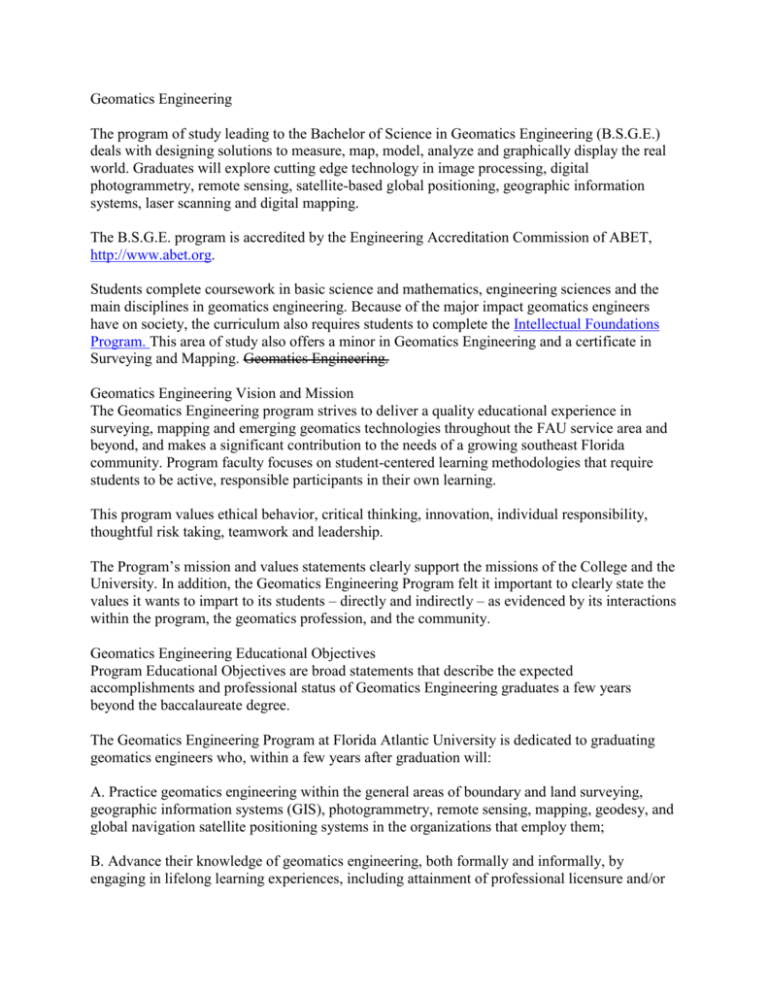
Geomatics Engineering The program of study leading to the Bachelor of Science in Geomatics Engineering (B.S.G.E.) deals with designing solutions to measure, map, model, analyze and graphically display the real world. Graduates will explore cutting edge technology in image processing, digital photogrammetry, remote sensing, satellite-based global positioning, geographic information systems, laser scanning and digital mapping. The B.S.G.E. program is accredited by the Engineering Accreditation Commission of ABET, http://www.abet.org. Students complete coursework in basic science and mathematics, engineering sciences and the main disciplines in geomatics engineering. Because of the major impact geomatics engineers have on society, the curriculum also requires students to complete the Intellectual Foundations Program. This area of study also offers a minor in Geomatics Engineering and a certificate in Surveying and Mapping. Geomatics Engineering. Geomatics Engineering Vision and Mission The Geomatics Engineering program strives to deliver a quality educational experience in surveying, mapping and emerging geomatics technologies throughout the FAU service area and beyond, and makes a significant contribution to the needs of a growing southeast Florida community. Program faculty focuses on student-centered learning methodologies that require students to be active, responsible participants in their own learning. This program values ethical behavior, critical thinking, innovation, individual responsibility, thoughtful risk taking, teamwork and leadership. The Program’s mission and values statements clearly support the missions of the College and the University. In addition, the Geomatics Engineering Program felt it important to clearly state the values it wants to impart to its students – directly and indirectly – as evidenced by its interactions within the program, the geomatics profession, and the community. Geomatics Engineering Educational Objectives Program Educational Objectives are broad statements that describe the expected accomplishments and professional status of Geomatics Engineering graduates a few years beyond the baccalaureate degree. The Geomatics Engineering Program at Florida Atlantic University is dedicated to graduating geomatics engineers who, within a few years after graduation will: A. Practice geomatics engineering within the general areas of boundary and land surveying, geographic information systems (GIS), photogrammetry, remote sensing, mapping, geodesy, and global navigation satellite positioning systems in the organizations that employ them; B. Advance their knowledge of geomatics engineering, both formally and informally, by engaging in lifelong learning experiences, including attainment of professional licensure and/or graduate studies. C. Serve as effective professionals, based on strong interpersonal and teamwork skills, an understanding of professional and ethical responsibility, and a willingness to take the initiative and seek progressive responsibilities. D. Participate as leaders in activities that support service to, and/or economic development of, the region, the state and the nation. Geomatics Engineering Student Outcomes The educational objectives of the Bachelor of Science in Geomatics Engineering program are achieved by ensuring that graduates have the following characteristics or student outcomes: a. An ability to apply knowledge of mathematics, science and engineering; b. An ability to design and conduct experiments, as well as to analyze and interpret data; c. An ability to design a system, component or process to meet desired needs within realistic constraints, such as economic, environmental, social, political, ethical, health and safety, manufacturability and sustainability; d. An ability to function on multidisciplinary teams; e. An ability to identify, formulate and solve engineering problems; f. An understanding of professional and ethical responsibility; g. An ability to communicate effectively; h. The broad education necessary to understand the impact of engineering solutions in a global, economic, environmental and societal context; i. A recognition of the need for and an ability to engage in lifelong learning – specifically, graduates will be successful in finding professional employment, attaining professional licensure, and/or pursing further academic studies;; j. A knowledge of contemporary issues; k. An ability to use the techniques, skills and modern engineering tools necessary for engineering practice – specifically, graduates will have an advanced understanding of the following areas of geomatics engineering: 1) Surveying, including but not limited to, boundary and land surveying, subdivision and plat creation, control surveys, construction surveys; 2) Geographic Information Systems (GIS); 3) Photogrammetry and Remote Sensing; 4) Mapping, to include but no limited to topographic maps, cadastral maps and land use maps; 5) Geodesy; and 6) Global Navigation Satellite Positioning Systems (GPS, GLONASS, etc.). Link to Geomatics Engineering Minor Link to Certificate in Surveying and Mapping Geomatics Engineering Bachelor of Science in Geomatics Engineering Admission Requirements All students must meet the minimum admission requirements of the University. Please refer to the Admissions section of this catalog. All students must meet the preprofessional requirements listed above in order to be accepted into the Geomatics Engineering program. Prerequisite Coursework for Transfer Students Students transferring to Florida Atlantic University must complete both lower-division requirements (including the requirements of the Intellectual Foundations Program) and requirements for the college and major. Lower-division requirements may be completed through the A.A. degree from any Florida public college, university or community college or through equivalent coursework at another regionally accredited institution. Before transferring and to ensure timely progress toward the baccalaureate degree, students must also complete the prerequisite courses for their major as outlined in the Transfer Student Manual. All courses not approved by the Florida Statewide Course Numbering System that will be used to satisfy requirements will be evaluated individually on the basis of content and will require a catalog course description and a copy of the syllabus for assessment. Coursework for Transfer Students In order to minimize the time necessary to complete the Geomatics Engineering degree, transfer students entering the University with an A.A. degree should structure their programs to include the following: Topics Credits (1) English Composition 6 (two 3-credit courses) Social Science 6 (two 3-credit courses) Humanities 6 (two 3-credit courses) Complete Calculus Sequence 12 (three 4-credit courses) Differential Equations 3 (one 3-credit course) General Chemistry, with Lab 4 (one 4-credit course, including lab) Calculus-based Physics, with Labs 8 (two 4-credit courses, including labs) Fundamentals of/Introduction 3 (one 3-credit course) to Engineering (2) Notes: (1) The number of credits may vary by institution. (2) An introductory course in engineering is preferred. However, substitutions may be allowed, provided they are part of a cohesive pre-engineering A.A. degree program. Degree Requirements The Bachelor of Science in Geomatics Engineering degree will be awarded to students who: 1. Meet all general degree requirements of the University; 2. Complete the curriculum for the B.S.G.E. in Geomatics Engineering degree (see below); 3. Take the National Council of Examiners for Engineering and Surveying (NCEES) Fundamentals of Surveying Examination (the first of two exams necessary for the professional surveyors and mappers license). Contact Geomatics Engineering for details. Curriculum (Changes below effective spring 2015.) The Bachelor of Science in Geomatics Engineering degree requires 120 credits. For credit toward the degree, a grade of "C" or better must be received in each course listed, except for humanities and social science courses not applied toward Writing Across Curriculum (Gordon Rule) writing requirements. In addition, all prerequisites for each mathematics, science or engineering course must be completed with a grade of "C" or better before enrollment is permitted. The degree components are listed below. General Studies College Writing 1 (1), (2) ENC 1101 3 College Writing 2 (1), (2) ENC 1102 3 Intellectual Foundations Program: Society and Human Behavior Courses (1), (3) 6 Intellectual Foundations Program: Global Citizenship Courses (1), (3) 6 Intellectual Foundations Program: Creative Expressions Courses (1), (3) 6 Total 24 Basic Mathematics and Sciences Calculus with Analytic Geometry 1 (1), MAC 2311 4 (4) Calculus with Analytic Geometry 2 (1), MAC 2312 4 (4) Calculus with Analytic Geometry 3 MAC 2313 4 Engineering Math 1 MAP 3305 3 Probability and Statistics for Engineers STA 4032 3 General Chemistry 1 (1) CHM 2045 3 General Chemistry 1 Lab (1) CHM 2045L 1 Physics for Engineers 1 (1), (5) PHY 2048 3 General Physics 1 Lab PHY 2048L 1 Physics for Engineers 2 (1), (5) PHY 2044 General Physics 2 Lab PHY 2049L 1 Introduction to Physical Geography GEO 2200C 3 Total 3 33 Engineering Fundamentals Fundamentals of Engineering EGN 1002 3 Introduction to Geomatics Engineering SUR 2034 3 Total 6 Professional Core (6) Fundamentals of Surveying SUR 2101 2 Fundamentals of Surveying Lab SUR 2101L 1 Fundamentals of AutoCAD CGN 2327 3 Computer Applications in Engineering EGN 2213 1 3 Introduction to Mapping and GIS (7) GIS 3015C 3 Surveying Data Analysis SUR 3643 3 Digital Photogrammetry Principles and SUR 4331 Applications (8) 2 Digital Photogrammetry Principles and SUR 4331L Applications Lab (8) 1 Automated Surveying and Mapping 2 SUR 3141 Automated Surveying and Mapping Lab SUR 3141L 1 Principles of Geographic Information Systems (7) GIS 4043C 3 Introduction to Geodesy SUR 3530 3 Engineering and Construction Surveying SUR 3205 2 Engineering and Construction Surveying Lab SUR 3205L 1 Land Subdivision and Platting SUR 3463 2 Land Subdivision and Platting Lab SUR 3463L 1 Civil, Environmental and Geomatics Engineering Design 1 CGN 4803C 3 Remote Sensing of the Environment (7) GIS 4035C 3 Legal Aspects of Surveying SUR 4403 3 Satellite Positioning SUR 4531 2 Satellite Positioning Lab SUR 4531L 1 Civil, Environmental and Geomatics Engineering Design 2 CGN 4804C 3 Introduction to Terrestrial Laser Scanning SUR 4150C 3 Total 51 Technical Electives (select two courses from the list below) (9) Programming in GIS GIS 4102C 3 Field Methods GLY 4750C 3 Hydrogeology GLY 4822 3 Transportation and Spatial Organization GEO 4700 3 Application in GIS 3 GIS 4048C Introduction to Hydrogeology Modeling GLY 4832C and Aquifer Test 3 Digital Image Analysis GIS 4037C 3 Geovisualization and GIS GIS 4138C 3 Engineering Geology GLY 4830 3 Entrepreneurship ENT 4024 3 Business Law 1 BUL 4421 3 Transportation Operations and Logistics TTE 4105 Management 3 Construction Project Management CCE 4031 3 GIS for Civil Engineering Applications CGN 4321 3 Engineering Economics EGN 4613 3 Hydrographic Surveying (7) SUR 4302 2 Hydrographic Surveying Lab (7) SUR 4302L 1 Thermal Infrared Remote Sensing and Applications SUR4384 3 Total 6 Notes: (1) Contributes to University Core Curriculum requirements. (2) Contributes to Writing Across Curriculum (Gordon Rule) writing requirement. (3) Intellectual Foundations Program courses, totaling 6, must be selected to satisfy Writing Across Curriculum (Gordon Rule) writing requirements. (4) Contributes to Gordon Rule mathematics requirement. (5) PHY 2048 and PHY 2049 (4 credits each) are acceptable substitutes, but only 6 credits will apply toward the degree. (6) All professional core courses contain a communications component (writing or speaking). (7) Includes a 1-credit laboratory. (8) GIS 4023 is an acceptable substitute. (9) Up to 6 credits may be taken from Department of Civil, Environmental and Geomatics Engineering graduate courses—this is highly recommended for students planning to pursue the B.S./M.S. Sample Four-Year Program of Study for Bachelor of Science in Geomatics Engineering First Year, Fall (14 credits) College Writing 1 ENC 1101 3 General Chemistry 1 (eff. spring 2015) CHM 2045 3 General Chemistry 1 Lab (eff. spring 2015) CHM 2045L Calculus with Analytic Geometry 1 MAC 2311 4 Fundamentals of Engineering EGN 1002 1 3 First Year, Spring (14 credits) College Writing 2 ENC 1102 3 Physics for Engineers 1 PHY 2048 3 General Physics 1 Lab PHY 2048L 1 Calculus with Analytic Geometry 2 MAC 2312 4 Intro to Geomatics Engineering SUR 2034 3 Physics for Engineers 2 PHY 2044 3 General Physics 2 Lab PHY 2049L 1 Calculus with Analytic Geometry 3 MAC 2313 4 Computer Applications in Engineering 1 EGN 2213 3 Intellectual Foundations Course 1 3 Second Year, Fall (14 credits) Second Year, Spring (15 credits) Introduction to Mapping and GIS GIS 3015C 3 Engineering Math 1 MAP 3305 3 Fundamentals of AutoCAD CGN 2327 3 Intellectual Foundations Course 2 3 Intellectual Foundations Course 3 3 Second Year, Summer (6 credits) Fundamentals of Surveying SUR 2101 2 Fundamentals of Surveying Lab SUR 2101L 1 Probability and Statistics for Engineers STA 4032 3 Third Year, Fall (15 credits) Surveying Data Analysis SUR 3643 3 Digital Photogrammetry principles and SUR 4331 applications 2 Digital Photogrammetry principles and SUR 4331L applications Lab 1 Automated Surveying and Mapping SUR 3141 2 Automated Surveying and Mapping Lab SUR 3141L 1 Introduction to Physical Geography GEO 2200C 3 Intellectual Foundations Course 4 3 Third Year, Spring (15 credits) Principles of Geographic Information Systems GIS 4043C 3 Introduction to Geodesy SUR 3530 3 Engineering and Construction Surveying SUR 3205 2 Engineering and Construction Surveying SUR 3205L 1 Lab Land Subdivision and Platting SUR 3463 Land Subdivision and Platting Lab SUR 3463L 1 Intellectual Foundations Course 5 2 3 Fourth Year, Fall (15 credits) Civil, Environmental and Geomatics Engineering Design 1 CGN 4803C Remote Sensing of the Environment GIS 4035C 3 Legal Aspects of Surveying SUR 4403 3 Satellite Positioning SUR 4531 2 Satellite Positioning Lab SUR 4531L 3 1 Geomatics Engineering Technical Elective 1 3 Fourth Year, Spring (12 credits) Civil, Environmental and Geomatics Engineering Design 2 CGN 4804C 3 Introduction to Terrestrial Laser Scanning SUR 4150C 3 Geomatics Engineering Technical Elective 2 3 Intellectual Foundations Course 6 3 Minors and Certificate Programs Appropriate for Geomatics Engineering Geomatics engineering encompasses many disciplines. Various departments offer minors and certificate programs that augment a student's geomatics engineering education. Students are encouraged to pursue a minor or certificate, such as: Business Administration (College of Business) Geographic Information Systems certificate program, highly recommended (Department of Geosciences) Geography (Department of Geosciences) Geology (Department of Geosciences) Mathematics (Department of Mathematical Sciences) Statistics (Department of Mathematical Sciences) Obtaining a minor or certificate will require completing credits beyond the 120 required for the B.S.G.E. in Geomatics Engineering. Contact the department offering the minor or certificate for more details. Cooperative Education Geomatics Engineering majors are strongly encouraged to gain practical experience through participation in Cooperative Education. For information, contact the FAU Career Development Center, 561-297-3536 or visit its website at www.fau.edu/cdc. Geomatics Engineering Minor Students minoring in Geomatics Engineering will complete a minimum of 18 credits with a grade of "C" or better in each course. Of the 18 credits, a minimum of 15 must be earned at FAU. Selected courses must be checked for the proper requirements. The minor is available to all fulltime FAU students pursuing a declared major. Required Courses (9 credits) Introduction to Geomatics Engineering SUR 2034 3 Fundamentals of Surveying (1) SUR 2101 2 Fundamentals of Surveying Lab (1) SUR 2101L 1 Fundamentals of AutoCAD CGN 2327 3 Select additional courses from below for a minimum of 9 credits Digital Photogrammetry principles and applications SUR 4331 2 Digital Photogrammetry principles and applications Lab SUR 4331L 1 Surveying Data Analysis (3) SUR 3643 3 Automated Surveying and Mapping (2) SUR 3141 2 Automated Surveying and Mapping Lab (2) SUR 3141L 1 Land Subdivision and Platting (2) SUR 3463 2 Land Subdivision and Platting Lab (2) SUR 3463L 1 Engineering and Construction Surveying (4) SUR 3205 2 Engineering and Construction Surveying Lab (4) SUR 3205L 1 Introduction to Geodesy (5) SUR 3530 3 Satellite Positioning (6) SUR 4531 2 Satellite Positioning Lab (6) SUR 4531L 1 Legal Aspects of Surveying (2) SUR 4403 3 Principles of Geographic Information Systems (7) GIS 4043C 3 Introduction to Terrestrial Laser Scanning SUR 4150C 3 Any other Surveying and Mapping Technical Elective as determined by the Department 3 Notes: (1) Requires knowledge of geometry and trigonometry. (2) Requires SUR 2101/SUR 2101L, Fundamentals of Surveying/ Lab, as prerequisites. (3) Requires SUR 2101/SUR 2101L, Fundamentals of Surveying/ Lab, MAC 2312 or MAC 2282, as prerequisites; and STA 4032 as corequisite. (4) Requires SUR 3643, Surveying Data Analysis, as a prerequisite. (5) Requires MAC 2312 or MAC 2282, as a prerequisite. (6) Requires SUR 3530, Introduction to Geodesy, as a prerequisite. Surveying and Mapping Certificate (Title change effective spring 2015.) The Geomatics Engineering program offers undergraduates a certificate in Surveying and Mapping. Geomatics Engineering Students are entitled to the certificate by completing a minimum of 12 credits of coursework with a grade of "C" or better. Selected courses must be checked for the proper prerequisites. The certificate is open to both degree-seeking and nondegree-seeking students. Required Courses (6 credits) Introduction to Geomatics Engineering SUR 2034 3 Fundamentals of Surveying (1) SUR 2101 2 Fundamentals of Surveying Lab (1) SUR 2101L 1 Select additional courses from below for a minimum of 6 credits Digital Photogrammetry Principles and Applications SUR 4331 2 Digital Photogrammetry Principles and Applications Lab SUR 4331L 1 Automated Surveying and Mapping (2) SUR 3141 2 Automated Surveying and Mapping Lab (2) SUR 3141L 1 Land Subdivision and Platting (2) SUR 3463 2 Land Subdivision and Platting Lab (2) SUR 3463L 1 Legal Aspects of Surveying (2) SUR 4403 3 Principles of Geographic Information Systems (7) GIS 4043C 3 Introduction to Terrestrial Laser Scanning SUR 4150C 3 Notes: (1) Requires knowledge of geometry and trigonometry. (2) Requires SUR 2101/SUR 2101L, Fundamentals of Surveying/ Lab, as prerequisites. Approved by: Date: Department Chair: ________________________________ ____________________ College Curriculum Chair: _________________________ ____________________ College Dean: ___________________________________ ____________________ UUPC Chair: ____________________________________ ____________________ Undergraduate Studies Dean: _______________________ ____________________ UFS President: __________________________________ ____________________ Provost: ________________________________________ ____________________
